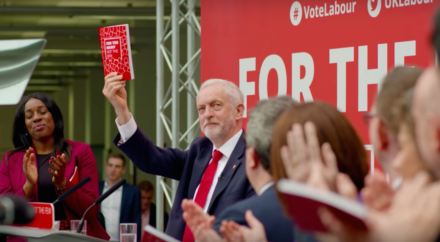
Once again the Labour Party is spending a summer at war with itself. The disgust at antisemitism that has been rightly vocalised by Jeremy Corbyn, Tom Watson and many others has not stopped the issue becoming a political football in Labour’s vastly overheated National Executive Committee elections.
Many Corbyn supporters, the vast majority of whom share the disgust at antisemitism, still feel bruised after the attempted ousting of Corbyn in 2016 and vindicated by the party’s better-than-expected showing at the general election. They know that the Venn diagram of those who are outraged and upset by antisemitism has a lot of overlap with those who will never accept Corbyn as a leader. Some have therefore understandably – if wrongly, in my view – seen this issue purely through those old lenses.
A natural defensiveness has kicked in and some are taking advantage of that for factional purposes. There are members of the party, new and old, who relish the more febrile atmosphere. Who do enjoy fighting each other more than they enjoy fighting for the country. There are others who have been willing for too long to turn a blind eye to those who reliably vote along factional lines but behave appallingly. Too often, dealing with poor behaviour is seen as a distraction from the task of socialism. But socialism can only really be ‘for the many’ when it comes as part of a welcoming, open and tolerant environment.
I was not a supporter of Jeremy Corbyn before last year’s snap election. I was then and remain now on the soft left of the party, but I was concerned by his baggage and dubious about the electoral viability of a more left-wing Labour Party. I was wrong – at least about the latter part. Gloriously so.
There are some on the right of the party who don’t want to see Labour implement a more socialist plan in government. Rumours abound of meetings held to discuss ways to work around the leader or split the party. There are definitely days when I could walk away. Despite all I’ve said about how enmeshed the party is in my life, despite 28 years of membership, there are those days when the culture we find ourselves in – online in particular, but sometimes in meetings too – is just too toxic to put up with.
But any split would almost certainly mean a new party that offered an outright rejection of Corbynism, including the policy platform that made his election as party leader a much-needed wake-up call. A call that led to us offering a popular socialist alternative to the country, and attracted the vast majority of new members who are not cartoon militants but the enthused, spirited socialists we need on the doorstep. A return to milquetoast social democracy rather than a strong socialist economic response to post-crash austerity is not the answer.
If the party formally splits and the options become a left willing to put up with vile behaviour and a centre unwilling to radically intervene in the economy, where do I go? I refuse to believe that Labour members should have to choose between a needlessly toxic atmosphere and a rejection of the kind of economic change we know the country needs. I refuse to believe it isn’t possible to be left-wing and, well, nice!
I welcome yesterday’s intervention by Matt Zarb-Cousin, who has stood up for Tom Watson. Unlike myself or arguably Tom, Matt’s loyalty to the Corbyn project has never wavered. His is a brave olive branch in these divided times and some will and have criticised him for it. But if Labour is to become a party that can govern from the left, Matt is right that we need to be united. And some of the impetus for that has to come from the smaller but not insignificant portion of the membership who didn’t vote for Corbyn as leader. That means me and people like me.
I’m not talking about uncritical support: I’ve never given that to a leader in my life. Not to Blair, not to Brown, not even to Ed Miliband whose leadership campaign I spent hundreds of hours volunteering on. When leaders let me down, I say so. It makes my words more meaningful when I praise them.
But it does mean accepting that Corbyn has earned his leadership stripes. It means not just accepting that we were wrong about the electoral viability of a more left-wing platform, but revelling in our wrongness.
I want to see Corbyn step down from this impasse over the International Holocaust Remembrance Alliance definition of antisemitism because I want to see him step up to lead us to a socialist alternative to austerity. I want to see him humbly rebuild relations with the Jewish community so we can build a government that works for all our communities. I want Labour to be better than it currently is culturally on a range of issues so we can achieve what I never thought possibly politically. That’s my agenda – and I think it’s one the vast majority of Labour members can agree with.
I don’t want to see the Labour Party split into two lesser versions of itself: one that can’t see how intolerant it is, and another that can’t see how inadequate the old solutions are. Very few of us do. Let’s instead heal the problems we have in the party, and work together to deliver a radical, socialist government.
Emma Burnell is co-chair of Open Labour and writes about politics.




More from LabourList
‘Labour must confront the crisis of first past the post before it’s too late’
Unite to debate affiliation with Labour Party at conference next year
Miliband tops LabourList Cabinet league table, with gender divide in PM approval